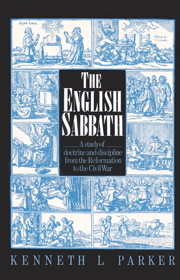Book contents
- Frontmatter
- Contents
- Acknowledgements
- Abbreviations
- 1 The case for a reappraisal
- 2 Medieval sabbatarianism and Reformation reaction
- 3 Early Elizabethan sabbatarianism: 1558–82
- 4 Late Elizabethan and Jacobean sabbatarianism: 1583–1617
- 5 The Book of Sports controversy: 1617–18
- 6 The 1620s: continued consensus
- 7 The sabbatarian controversy
- Epilogue
- Appendix
- Bibliography
- Index
7 - The sabbatarian controversy
Published online by Cambridge University Press: 23 November 2009
- Frontmatter
- Contents
- Acknowledgements
- Abbreviations
- 1 The case for a reappraisal
- 2 Medieval sabbatarianism and Reformation reaction
- 3 Early Elizabethan sabbatarianism: 1558–82
- 4 Late Elizabethan and Jacobean sabbatarianism: 1583–1617
- 5 The Book of Sports controversy: 1617–18
- 6 The 1620s: continued consensus
- 7 The sabbatarian controversy
- Epilogue
- Appendix
- Bibliography
- Index
Summary
Given the open conflict between Calvinists and Arminians in parliament, court, and the Church during the early years of Charles' reign, to argue that there was general agreement on the sabbath doctrine would seem to stretch the case for consensus too far. However, the evidence calls for such a conclusion. Arminian and Calvinist defences of the scholastic interpretation illustrate that while these men clashed over the weighty matters of predestination and the limits of God's grace, the morally binding nature of the Sabbath was a commonly acknowledged point of orthodoxy. Visitation articles from the 1620s and 1630s demonstrate that Sabbatarian discipline continued to be a priority, despite the controversies after 1633. To understand the conflicts of the 1630s, we must first pursue several personal clashes, which initially focused on episcopal and secular jurisdiction. These disputes, which resulted in the reissuing of the Book of Sports, broadened into a theological debate, as Laud's supporters defended the reissuing of the Book of Sports against Sabbatarian attacks. Although Laud's apologists were unified in their support of episcopal authority and the use of recreations on Sunday, they did not present a consistent position on the sabbath doctrine. Indeed while Heylyn, Pocklington, and others claimed that the scholastic interpretation was a puritan innovation, Christopher Dow declared that the Church had always acknowledged the morally binding nature of the sabbath precept. The sabbath doctrine was being used as a theological football once again, and was to become the war-cry of those who opposed the Laudian innovations of the 1630s.
- Type
- Chapter
- Information
- The English SabbathA Study of Doctrine and Discipline from the Reformation to the Civil War, pp. 178 - 216Publisher: Cambridge University PressPrint publication year: 1988

